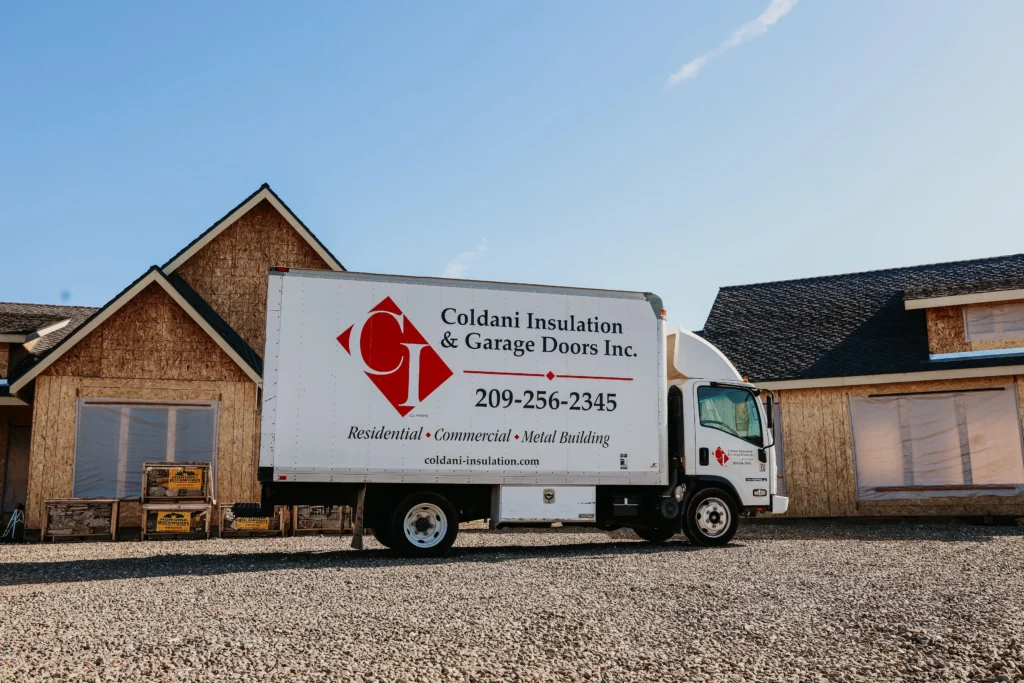New Building Insulation
Building a new home or adding an addition on to your existing home is a very exciting process. It is also your first and last time to get things right from an energy savings, acoustical and insulation perspective. If you have ever lived in an old poorly insulated home you can appreciate a home that can keep you comfortable throughout the year while not costing a fortune to heat and cool. Energy costs, both electricity and natural and propane gas have increased steadily over time and will only go higher. At Coldani Insulation & Garage Doors we believe that it is important to insulate a home correctly, effectively while maintaining a budget and creating a long lasting energy efficient home.

A few things you should know about your new home or addition:
Insulation that is installed in your new home in California is governed by some mandatory minimum energy efficiency standards. These specifications are set by a document called a Title 24.
Your Title 24 is a summary of all the components of your home that uses or saves energy. Every single light, major appliance, water heater, furnace, air conditioner, window and door is input into an equation that must meet a certain level of energy efficiency. Almost every surface of your home must be insulated to create an effective thermal envelope and ensure your home is comfortable and energy efficient. The only exceptions are interior floors, interior floors and your garage, which we also recommend insulating. (See below where we cover Extras.) When requesting a bid for insulating your new home, the title 24 is going to be an essential document to include with your approved plans. This will state the insulation R-Value requirements at each surface of your home (attic, walls, crawl space etc) as well as showing other requirements. You can always upgrade or put better or higher insulation R-Values. Installing less than the minimum requirements will result in a failed inspection or not meeting your title 24, which is required before a home is certified for occupancy. Special inspections may need to be scheduled for a QII or HERS rater before you proceed to drywall.
The same characteristics that make insulation thermally effective make it good for blocking/ absorbing sound transmission. A hollow wall or floor cavity echoes and vibrates and a surprising amount can be heard through uninsulated walls and floors. Insulation helps absorb these sound waves. Acoustical insulation in new homes is a great upgrade that gives more privacy, enjoyment and comfort in your home. After all, we don’t want to hear someone going to the bathroom, watching TV in the next room or hear the sound of your laundry going through the dryer.
Acoustical insulation is most often fiberglass because of its good sound deadening properties and cost effectiveness. Rockwool insulation is what we recommend for the particularly important sound walls. Rockwool insulation has the best sound deadening abilities because of its high density. It is a good idea to ask your insulation contractor for a separate quote for some extra acoustical insulation. We are always happy to help identify the most important walls and floors to insulate for the purpose of sound cancellation. At Coldani Insulation & Garage Doors we know which areas are important and which areas can be left out to maximize your acoustical results.
Remember, you are building your home and have this one chance to make the most out of your spaces. A home office, bedroom or theatre room is only enjoyable if it does not disturb the rest of the family. Retrofitting acoustical insulation later is not ever a good cost effective option and will cost much more later compared to doing it right the first time.
Your garage can be many things. It can be your home gym, office, storage, work shop, kid’s playroom, music studio or even…the home of your cars. No matter what you use your garage for, it is a good idea to insulate this area to help maintain a more even temperature. An average garage is 10-15 degrees cooler in the summer and warmer in the winter. That can make all the difference when you are working in the garage on a 100 degree summer day. 85 degrees is a lot better than 100 and the same goes for the winter. This is without any heating or cooling!
If budget is an issue, we recommend insulating your garage walls. That way your garage attic can be insulated after drywall without much issue, whereas your walls would have to be drilled and sprayed with loose fill insulation, patched textured and painted. Patching and repairing walls typically costs as much or more than the insulation itself. The walls will be the less expensive than your garage attic too.
Your garage door is another important aspect to when insulating. Make sure to select an insulated garage door. An insulated garage door not only completes the envelope of your garage but may be the most important part of an insulated garage as a whole. Garage doors are by in large made of steel, which conducts heat and hold extremely well and radiates that heat into the whole garage. An insulated garage door is also much more sturdy, quiet and longer lasting than the more common hollow “pan” doors that are on most older homes.
Not sure what insulation is best for you home?
Schedule a free professional evaluation and quote.